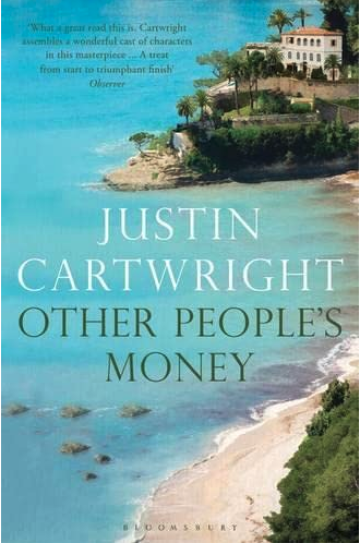Other People's Money by Justin Cartwright
Justin Cartwright's new novel, Other People's Money (Bloomsbury), is a biting satire of the financial collapse of a bank following the steep economic falls of 2008. Set in the morality-upended world of inherited power structures dominated by idolatry of the buck, a benign charity case poses a real threat to the hollow colossus of big banking, and an act of good will instead becomes an act of good riddance.
Sir Harry Trevelyan-Tubal is the ailing tenth-generation head of the small, privately owned London-headquartered bank Tubal and Co. whose son, Julian, now grapples with the reins that years ago had been thrust into his hands. Believing in the validity of a Nobel Prize winner's economic formula, the bank's hedge fund has become horribly beset with major toxic assets, plunging the company's real value and endangering the bank's disturbingly oblivious patrons.
Meanwhile, the eccentric playwright, Artair MacCleod, whose young actress ex-wife, Fleur, Sir Harry stole, discovers that his yearly charitable donation from Tubal has failed to materialize. A heroically artistic heavyweight in mind and spirit—whose next lead role he preemptively announces as belonging to Daniel Day Lewis, to some comic effect—his suspicions are only slightly aroused. However, the pressure he puts on the bank triggers a domino effect in which a local Cornwall Globe & Mail journalist, Melissa, unravels the twisted secret of Julian's intentions and a bank's fraudulent activity.
Despite Fleur's attempt to pay him off, £25,000 later, the truth is out there—as the young journalist's blog is aptly named—and continues to press up on the lid from within this Pandora's box.
Our patriarch Sir Harry smacks of one Nabokov's already-fallen heroes, or a Shakespearean pale king, like Lear, maybe: someone dilapidated who still believes themselves to be esteemed by virtue of their ass resting upon a throne. In his home at Antibes, he still blathers the tropes of banking tradition, which the stroke has rendered unintelligible flotsam projected through the foam that collects at the corners of his mouth. In Harry's senility, Estelle, the woman who has tended to (and unrequitedly loved) him for thirty years, refers to him as a “[suffering] invertebrate” whose “hand is contracting...and closes on her fingers with the simple-minded grip of a crab.”
In this moment, at least, Cartwright seems fittingly to be invoking the voice of another English literary heavy, T.S. Eliot, for his unforgettable anti-hero, Prufrock. Cartwright immures numerous characters in this seaborne, men-underwater metaphor—where features blur and identities distort—and there is a lot of meaningful, poetic heft in it. Cartwright is a master of the metaphor, amplifying and elevating the habits of his characters, despite their crudeness or banality. He weaves the plot with the curious dexterity of a maypole dance, effortlessly drawing skein over skein until the pole is dressed, proud and erect as any Brit.
And in fact, in the novel, the sacred specialness of the British identity—itself, like the pole—is only a matter of inherited garb: further proof of its fraudulence, as Julian muses, “What is it about the English upper classes that it is still so important to associate themselves with the countryside? Lurchers, rabbits, tweed, Viyella shirts, caps—flat caps are back—and those Dijon mustard trousers. Signifiers. Signifying that these people are the true people of England.” Earlier, too, he addresses Nigel on the tennis courts, “‘A chimera, Nigel, is a mythical beast made of the bits of mythical animals. That's what we are paying for: something which never existed.'”
In numerous ramifications, the novel probes this dynamic between truth and silence: for silence, some are bought, and some are merely snuffed out; so that what we believe, in the end, may be the chimera: a fantasy reality, an untruth so vague that it may as well be true. Often, characters will know one another's greatest criminal, carnal, or emotional shame and don't care to know the details so long as the money is sound, and the reputation that built it remains statuesque, a pristine marker of power. Fleur's secret affair with her foreign rugby-playing trainer twenty years her junior, Estelle's dutiful but silent and unrequited love for Sir Harry, and Julian's secret dealings with the American banker who intends to buy Tubal and Co.; each protects a horrible truth that, if allowed to surface, would dismantle the family and imperil the stability of the bank itself. Each in their own way has had to become an expert at covering their tracks, masquerading to submerge fraudulent activity that, however private, threatens to go public.
Meanwhile, in Artair, Cartwright has created an inspired maverick, a man who—for all his oddity—is incorruptible, and, above all, in the redemptive power of art, who implores the soul for answers. His ex-wife, Fleur, belatedly locates the essential chink in the Trevelyan-Tubal armor during a final arranged meeting with Artair, in which he recites a poem by Baudelaire, “[And] she sees that Artair has done something heroic: he has kept faith with art and its power. She sees that Harry and the family, for all their taste and sophistication, never speak to their souls.” Despite seemingly similar aims, Cartwright points to the inherent differences between the banker and the artist. While Artair seeks to transform reality in the pursuit of truth, visionary clarity—he is transparent as rainwater—Julian seeks to distort reality in the pursuit of greater abstraction, hoping to be so inscrutable as to go undetected—he is the thing behind the water. It is the artist's transparency as a sheep, then, that poses the greatest threat to the wolf in its clothing.
Yet, for all his broad, underlying philosophical strokes, Cartwright drops poignantly human moments and humor into Other People's Money. These moments of human weakness are powerfully sympathetic and, for the empathic reader, will redeem even the most despicable actor as he displays his right to be flawed, albeit fatally. Stirringly, Other People's Money never outright inveighs the criminal financial dealings it describes, but considers the real cost to the criminal, who himself is—or felt himself once to be—a man.
Justin Cartwright is the author of In Every Face I Meet, which was shortlisted for the Booker Prize; Leading the Cheers, winner of the Whitbread Award; The Promise of Happiness, winner of the Hawthornden Prize; and White Lightning, which was shortlisted for the Whitbread. He was born in South Africa and now lives in London.

 Audrey Schomer is a freelance reader, writer and lover of the arts living in New York City. A New England native, she graduated with a Bachelor of Arts degree in English and Film Studies from Mount Holyoke College in 2007. Contact her at
Audrey Schomer is a freelance reader, writer and lover of the arts living in New York City. A New England native, she graduated with a Bachelor of Arts degree in English and Film Studies from Mount Holyoke College in 2007. Contact her at